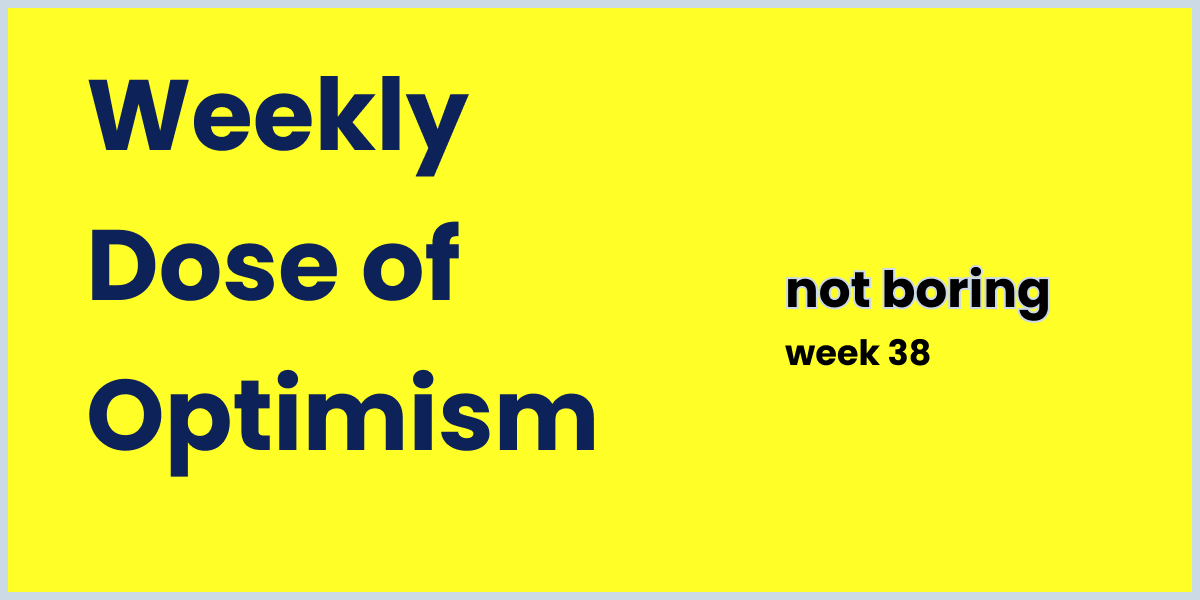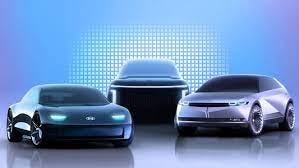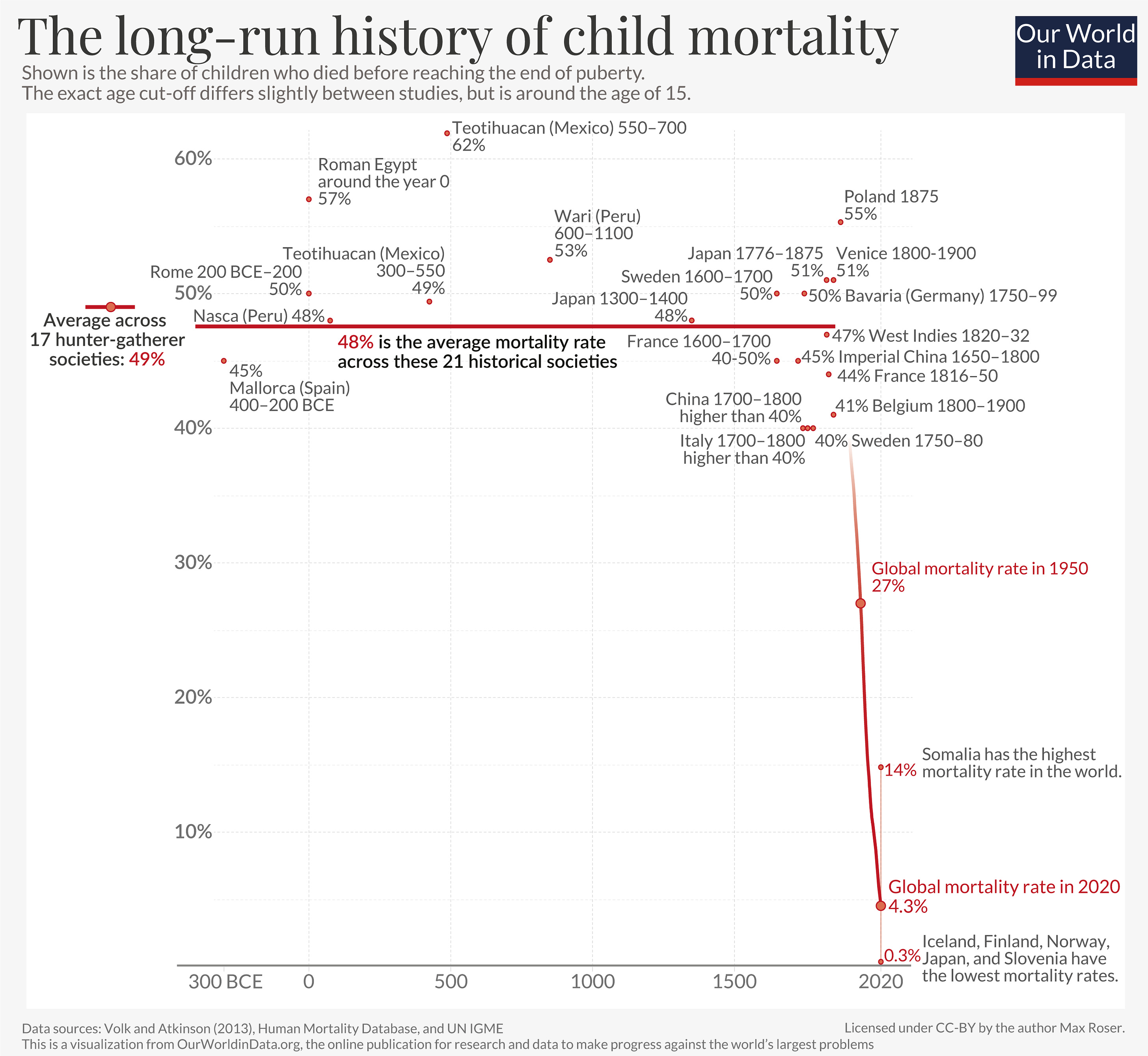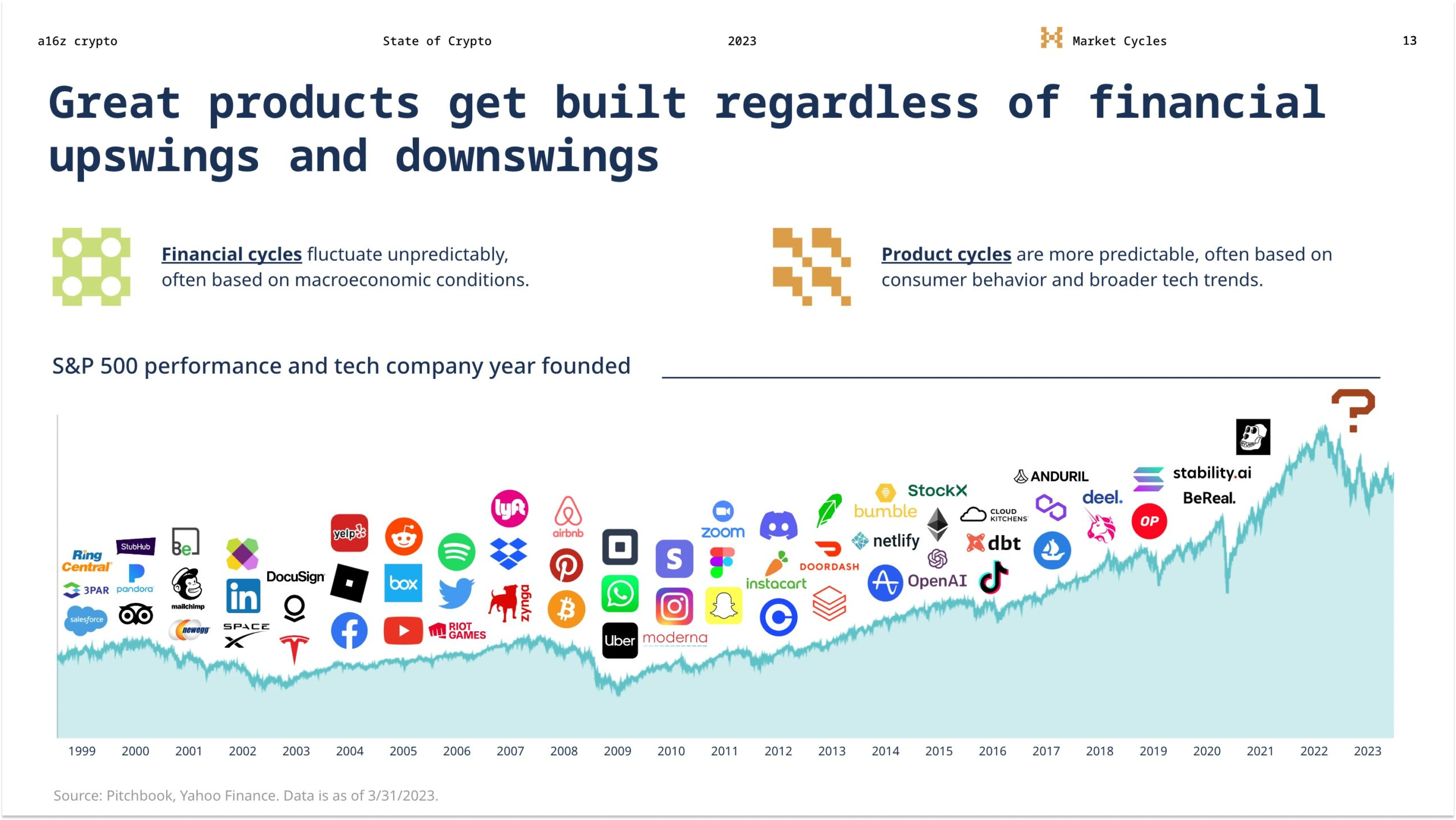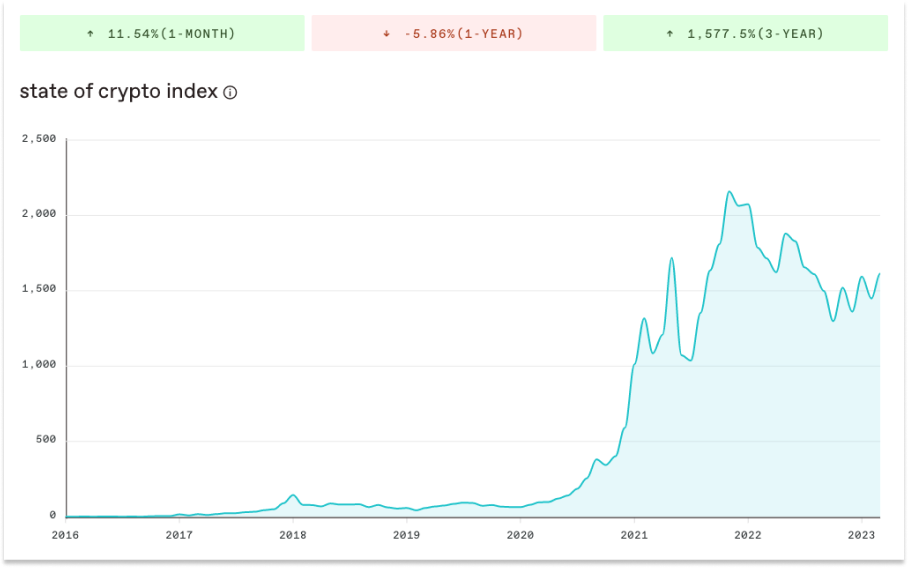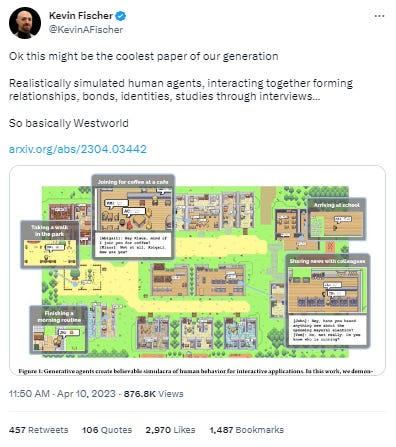Not Boring by Packy McCormick - Weekly Dose of Optimism #38
Weekly Dose of Optimism #38EVs, Battery Recycling, Child Mortality Rates, The State of Crypto, SimsGPT, The Problem of AbundanceHi friends 👋, Happy Friday and welcome back to our 38th Weekly Dose of Optimism. Not too much to report on our end heading into the weekend. Lots of good stuff happening out there in this ole world of ours. We’re here to bring it to you. Let’s get to it. The Weekly Dose is brought to you by... Tegus Overcome market headwinds with fast, accurate, and cost-effective expertise. Tegus is the affordable centralized research platform for at-cost expert calls, the largest and fastest growing expert transcript library of public and private market data, and most robust benchmarking, charting and comps tooling. With Tegus you can spend less time collecting and connecting disparate data and start maximizing what sets you apart – your unique synthesis and decision making. Ready to unlock the power of Tegus? Trial the benefits for free now below: (1) E.P.A. Lays Out Rules to Turbocharge Sales of Electric Cars and Trucks Coral Davenport for The New York Times
It seems as if EVs are not only here to stay, but that they’ll nearly 10x over the coming decade. Politics and views on government overreach aside, this is an ambitious plan that puts the U.S. on track to achieve its emissions slashing goals. Are EVs our planet’s saving grace? I don’t think so. They may be part of the story, but not the whole thing. I think some combination of technologies that make solar, nuclear, and fusion abundant will do more to solve our climate issues than restricting combustion engine cars. Whatever your views on Elon, he was about two decades ahead of his time on this whole EV trend. And if you subscribe to Tim Urban’s theory of Elon, this proliferation of EVs from other automakers was always part of the plan, too. High end EVs —> mass-market EVs —> automaker competition —> more sustainable energy future…a long and winding path for sure, but it’s seems like things are tracking to plan. (2) One of the biggest battery recycling plants in the US is up and running Julian Spector for Canary Media
As EVs proliferate, so too will demand for the critical minerals and components that make EVs possible, like lithium-ion batteries. While the price of lithium has plummeted in the last few months, our view is that there will be steadily increasing demand for these materials over the coming decades as the clean energy revolution trucks along. And with 50 million+ (Not Boring estimation) EVs being produced each year by 2032, we’re going to need a way to recycle and repurpose those cars’ components. In the U.S. those EV component recycling facilities are already coming online. The new factory mentioned in the story will be able to recycle over 70,000 EV battery packs annually (almost 9% of US EV sales in 2022.) As with any new major technology, there will be shakeups, but new industries and job (such as EV battery recycling) will be created to fill the void. (3) Mortality in the past: every second child died Max Roser for Our World in Data
There is perhaps not a more convincing statistic that life, broadly speaking, has improved than: “In our lifetime, the global death rate of children declined from around 50% to 4%.” Comparatively, no other stat really even matters. Literacy rates? Doesn’t matter if you can read if you’re likely to die before high school. Living older? Adding an incremental 2-3 years towards the end of life does basically nothing to age averages when 50% of the population dies before 15 (leaving 40+ years on the table). Democracy? That’s doubled in the last 50 years, but what good is freedom when you die before you can even vote. You get the idea. Life has gotten much better because much more life has been lived (on average) over the past 50 years. And much more life has been lived largely because less children are dying. (4) 2023 State of Crypto Report: Introducing the State of Crypto Index Daren Matsuoka, Eddy Lazzarin, Robert Hackett, Stephanie Zinn for a16zCrypto Packy here. On Tuesday, a16z crypto released its annual State of Crypto Report, and its chock full of optimistic data on web3. I particularly like this framework, which the team developed a few years ago, showing that token prices drive the things that actually matter: consumer interest, developer activity, and new companies. Those things grew in 2022 despite the fall in prices. It’s also timely. On Monday, I wrote Crypto (Could) Fixes This, and one of the main critiques I received is that you don’t actually need crypto. Mastodon exists, and it doesn’t touch crypto. Here’s my response: Mastodon is a pretty brutal experience, and most of the people who onboarded when Twitter looked to be falling apart had stopped using it just a couple months later. But because crypto incentivizes developers to build all sorts of composable software that makes crypto more usable generally, the experience of onboarding to a decentralized social platform like Farcaster and the apps built on top is already much easier than Mastodon, and constantly getting better. Bubbles have value if they leave behind useful infrastructure, and a16z’s framework captures that well. Not all of the data in the report is great for crypto/web3. a16z’s new State of Crypto Index, which looks at innovation and adoption indicators instead of price, is down 5.86% YoY (much less than prices). But the biggest lesson I took from the report is captured by the graphic I put at the top of this section — great startups are built in every kind of market. I’m excited to see the logos that get added to that graphic over the next few years. (5) Generative Agents: Interactive Simulacra of Human Behavior Joon Sung Park, Joseph C. O'Brien, Carrie J. Cai, Meredith Ringel Morris, Percy Liang, Michael S. Bernstein As this tweet (thanks Elon) pointed out, a team of researchers created what is basically an AI-powered The Sims. The study uses “generative agents", powered by ChatGPT, to simulate believable individual and social human behaviors…and it worked. The “agents” were making friends, dating, and even pulling off things we humans can’t, like coordinating arrival times to parties. Something something the next big thing will start out looking like a toy something something. First, this seems like it’d be pretty important in any kind of rollout of the Metaverse. Interact with NPCs in a realistic, human-like way. Maybe Westworld isn’t that far off. Secondly, and perhaps more realistically, a tool like this could help simulate scenarios and inform decision making — how will x population react to y, what characteristics of q would z find most attractive? Play those scenarios out a million times in seconds, using agents that behave like humans, and my bet is that result will be pretty similar to how real humans would behave. Bonus: The Problem of Abundance (🔒) Martin Gurri for The Free Press
This one is paywalled, but it’s worth the read if you subscribe to The Free Press or have a friend who does. Gurri, the author of The Revolt of the Public, discusses something we’ve been wrestling with in Not Boring: the messy fact that abundance doesn’t equal happiness, and in some cases, might actually detract from it. We put this in the Bonus section, because it’s not optimistic. It’s counter to a lot of what we want to believe. But it’s a good reminder that as we celebrate the incredible things humans are able to build and achieve, we need to put as much effort towards figuring out how to replace the meaning people derive from struggling to survive. Double Bonus: Our portfolio company, Oasis, launched Oasis AI in the App Store this week. Essentially, you talk into the app, and it transcribes your words and turns them into emails, essays, tweets, and more. It’s magical, and I use it daily to capture the random thoughts I have when I’m running around. Check it out here. Did you enjoy reading this Weekly Dose of Optimism? (Powered by Sprig) That’s all for this week. We’ll be back in your inbox on Monday. Thanks for reading, Dan |
Older messages
Sign in to Not Boring by Packy McCormick
Wednesday, April 19, 2023
Here's a link to sign in to Not Boring by Packy McCormick. This link can only be used once and expires after 24 hours. If expired, please try logging in again here. Sign in now © 2023 Packy
Intelligence Superabundance
Wednesday, April 19, 2023
Induced Demand, Jevons Paradox, Jeff Bezos, AI, and Our Jobs
Crypto (Could) Fixes This
Monday, April 10, 2023
Elon, Substack, and Crypto as Insurance
Weekly Dose of Optimism #37
Friday, April 7, 2023
Quantum Computers, Checks & Balances, AI Investment, Early Warning Pandemic Systems, Rex Woodbury on Optimism
Idea Olympics
Wednesday, April 5, 2023
The Adventures of Maya & Dev in the Near Future
You Might Also Like
🔮 $320B investments by Meta, Amazon, & Google!
Friday, February 14, 2025
🧠 AI is exploding already!
✍🏼 Why founders are using Playbookz
Friday, February 14, 2025
Busy founders are using Playbookz build ultra profitable personal brands
Is AI going to help or hurt your SEO?
Friday, February 14, 2025
Everyone is talking about how AI is changing SEO, but what you should be asking is how you can change your SEO game with AI. Join me and my team on Tuesday, February 18, for a live webinar where we
Our marketing playbook revealed
Friday, February 14, 2025
Today's Guide to the Marketing Jungle from Social Media Examiner... Presented by social-media-marketing-world-logo It's National Cribbage Day, Reader... Don't get skunked! In today's
Connect one-on-one with programmatic marketing leaders
Friday, February 14, 2025
Enhanced networking at Digiday events
Outsmart Your SaaS Competitors with These SEO Strategies 🚀
Friday, February 14, 2025
SEO Tip #76
Temu and Shein's Dominance Is Over [Roundup]
Friday, February 14, 2025
Hey Reader, Is the removal of the de minimis threshold a win for e-commerce sellers? With Chinese marketplaces like Shein and Temu taking advantage of this threshold, does the removal mean consumers
"Agencies are dying."
Friday, February 14, 2025
What this means for your agency and how to navigate the shift ͏ ͏ ͏ ͏ ͏ ͏ ͏ ͏ ͏ ͏ ͏ ͏ ͏ ͏ ͏ ͏ ͏ ͏ ͏ ͏ ͏ ͏ ͏ ͏ ͏ ͏ ͏ ͏ ͏ ͏ ͏ ͏ ͏ ͏ ͏ ͏ ͏ ͏ ͏ ͏ ͏ ͏ ͏ ͏ ͏ ͏
Is GEO replacing SEO?
Friday, February 14, 2025
Generative Engine Optimization (GEO) is here, and Search Engine Optimization (SEO) is under threat. But what is GEO? What does it involve? And what is in store for businesses that rely on SEO to drive
🌁#87: Why DeepResearch Should Be Your New Hire
Friday, February 14, 2025
– this new agent from OpenAI is mind blowing and – I can't believe I say that – worth $200/month
